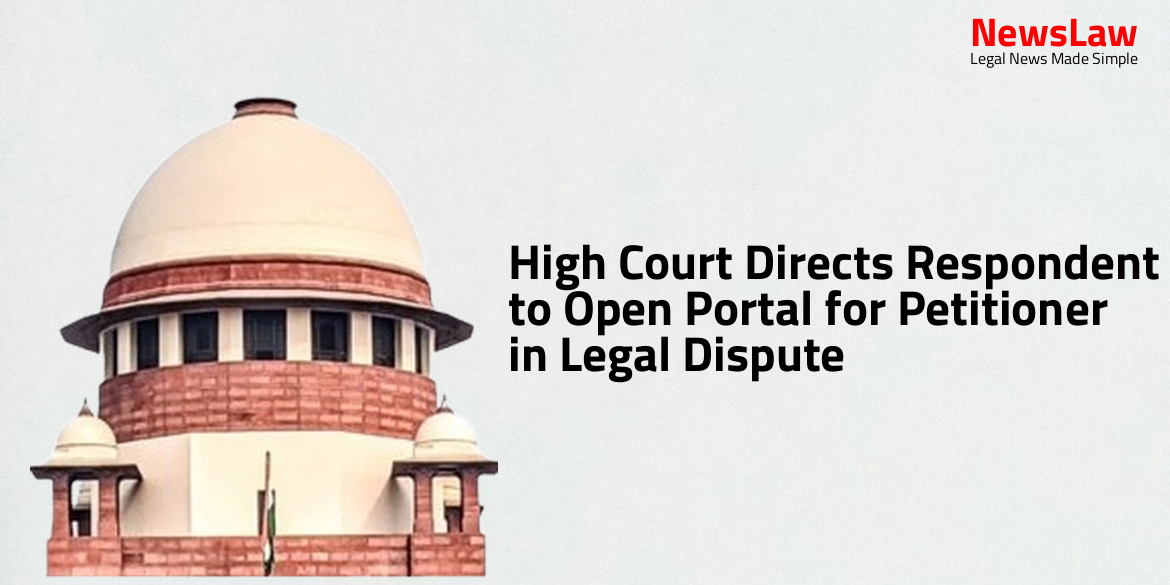Discover the in-depth legal analysis conducted by the court in a recent Company Law case. The case delves into the complexities of the Companies Act, shedding light on key principles such as the Duomatic Principle and Doctrine of Indoor Management. This summary focuses on the court’s meticulous examination of legal provisions and its impact on the case’s outcome.
Facts
- The respondent No 1 filed Company Petition No 01 of 2013 under Section 409 of the Companies Act, 1956 seeking injunction to stop the Annual General Meeting on 18.12.2013.
- The appointment of appellant-Mahima Datla, Purnima Manthena, and Indira Pusapati as Directors ratified in the AGM became final and binding on the Company and its members.
- The acts complained by respondent No 1 were directorial complaints and did not justify a case for winding up the Company.
- The Board of Directors appointed by appellant no. 1 shall hold office for 3 years from the date of assuming charge regardless of Section 152(6) of the Companies Act, 2013.
- The Company Petition by respondent No. 1 was dismissed as not maintainable due to lack of required shareholder support as per Section 399 of the 1956 Act.
- CLB validated the Board Meetings held on 09.04.2013, 10.04.2013, and 11.04.2013 as legal where appellant-Mahima Datla was appointed Managing Director of the Company.
- After 3 years, a new Board of Directors may be constituted as per the Act and Articles of Association of the Company.
- Other interim orders in place were vacated, and no costs were awarded.
- The Petition filed by respondent No. 1 on grounds of oppression or mismanagement failed and was liable to be dismissed.
- No evidence was presented to show that the Company’s affairs were conducted in a manner prejudicial to the interests of shareholders and the public.
- The Company, being profitable, had no evidence of mismanagement in the balance sheets.
- AGM was conducted on 18.12.2013 where appellant-Mahima Datla, Purnima, and Indira were recognized as Managing Director and Directors.
- The civil suit filed by respondent No. 1 challenged the transmission of shares and was directed to be disposed of by the Court.
- The Board of Directors was superseded, and forms filed by respondent Nos. 2 to 7 were declared null and void by CLB.
- Transmission of shares and inheritance issues were part of a civil matter and not under CLB jurisdiction.
- Decisions taken in the Board Meetings were ratified in the AGM held on 18.12.2013.
- Acts of Respondents 2 to 7 were deemed oppressive
- Board of Directors meetings on 09-04-2013, 10-04-2013, and 11-04-2013 were declared null and void
- Resolutions passed at the Annual General Meeting on 18-12-2013 were also nullified
- No act of oppression and mismanagement was found on the part of respondent No. 1
Also Read: Land Compensation Dispute: Legal Analysis
Issue
- The judgment dated 30.05.2016 in CP No 36 of 2014 addressed the legality and validity of the A.G.M conducted on 18.12.2013.
- The issue of whether the acts of the respondents were oppressive to the petitioner and if there was any mismanagement in the affairs of R1 Company was discussed.
- The judgment also considered the family relationship within the company and whether the respondent Company failed to comply with the petitioner’s requests for documents and inspection of books and accounts.
- The CLB concluded in para 100 that the petition was not maintainable and subsequently dismissed it.
Also Read: Legal Analysis on Insider Trading Allegations
Analysis
- Article 128 of the Articles of Association of the Company was directed to be substituted by the High Court.
- The appellant no. 1 was authorized to increase the number of directors in the Board of the Company to 3 under Sections 241 and 242(2)(a) of the Companies Act, 2013.
- A special resolution was required for appointing a person as a director, and certain disqualifications were outlined such as being an undischarged insolvent or convicted of an offense.
- The direction to increase the number of directors was found to contravene Section 196 of the Companies Act, 2013, and Part I of Schedule V.
- Article 135 and Article 136 of the Articles of Association regarding retirement and rotation of directors were also discussed in relation to the High Court’s direction.
- The direction of the High Court was deemed non-est in law due to conflict with the provisions of Section 152(6) of the Companies Act, 2013.
- The High Court’s direction enabling Dr. Renuka Datla and nominated Directors to continue for 3 years violates appointment and retirement provisions.
- The High Court applied Hindu Succession Act to grant transmission of 1/4 disputed shares to Dr. Renuka Datla, lacking transmission of the remaining 3/4 shares to appellants.
- High Court erred by not considering Duomatic Principle application and misinterpreting the Company Articles.
- G.V. Rao’s resignation was withdrawn before acceptance, as per evidence.
- High Court erred in delving into inheritance issues under Hindu Succession Act, which was subject to another civil suit.
- High Court’s equitable considerations grant of 1/4 shares to Dr. Renuka Datla was deemed illegal.
- The High Court’s analysis strayed from the scope of the Companies Act, by re-appreciating evidence and giving factual findings.
- High Court’s resolution on shareholder oppression and mismanagement deemed incorrect under Section 397 of the Companies Act.
- Dr. Renuka Datla’s participation in Board meetings without protest against G.V. Rao’s presence contradicted her subsequent legal actions.
- Validity of G.V. Rao’s resignation withdrawal and Board Meetings were key issues of the case.
- The Principle emanating from Salmon’s Case holds that a company is bound by the unanimous agreement of its members in matters intra vires.
- The Principle is applicable in the Indian legal context and is relevant in cases such as the Duomatic Principle and the Doctrine of Indoor Management.
- The Duomatic Principle is only applicable to bona fide transactions where all shareholders with the right to vote agree to a matter that a general meeting could carry into effect.
- Cases like Bowthorpe Holdings Ltd. v. Hills emphasize that transactions under the Duomatic Principle must be both intra vires and honest.
- The case of Salmon v. Salmon Co. Ltd. laid the foundation for the Principle, emphasizing that no fraud should be involved in transactions based on shareholder agreement.
- Fraud is a clear exception to the application of principles like the Duomatic Principle and Doctrine of Indoor Management.
- The judgment in Sangramsinh P. Gaekwad v. Shantadevi P. Gaekwad reiterates the exception of fraud to such principles.
- The judgment in Hanuman Prasad Bagri v. Bagress Cereals (P) Ltd. highlights the importance of just and equitable grounds in cases seeking winding up of a company.
- It is not advisable to take harsh conclusions when dealing with a Company manufacturing vaccines.
- Vaccines are crucial in the current times and we need to ensure the Company’s health to continue production.
- Logical conclusions from discussions should be carefully considered in this context.
Also Read: Correct Date of Birth Determination for VRS Benefits
Decision
- The High Court’s order dated 17.11.2017 is set aside as it was against the provisions of the Companies Act of 1956 and 2013.
- The order of the CLB dated 30.05.2016 is restored with modifications and additional conditions.
- Dr. Renuka Datla is to be appointed as Emeritus Consultant of the Company.
- A monthly payment of Rs.65 lakhs is to be made to Dr. Renuka Datla starting from April 2022.
- A lump sum payment of Rs.10 Crore is to be made to Dr. Renuka Datla by 31.05.2022, in lieu of all previous and future payments.
- Other facilities will also be provided to Dr. Renuka Datla.
Case Title: MAHIMA DATLA Vs. DR. RENUKA DATLA (2022 INSC 398)
Case Number: C.A. No.-002776-002776 / 2022



